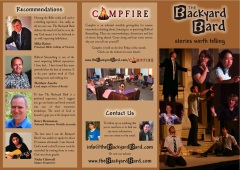- How do you remember show much?
- Do you have to do it word-for-word from the Bible?
- What translation do you use?
- Do you work in schools?
- Why are the angels Scottish?
How do you remember show much?
None of the storytellers in The Backyard Bard have extraordinary memories. The trick is to learn the story first and then the words will follow later. To learn the story, we get to know the characters, emotions, locations and plot structure first and then we should be able to tell the story in our own words before using the words of the Biblical author. We call this process internalisation rather than memorisation because we are getting the story inside of us rather than rote learning the story line-by-line.
See our introductory workshop for how this process works.
Do you have to do it word-for-word from the Bible?
The Backyard Bard has no claim on setting rules on what Biblical Storytelling is and isn't. Many storytellers rework the Biblical text for lots of reasons (even our own storytellers do as well sometimes). However, these are some reasons why we enjoy do storytellings word-for-word from the Bible.
- If someone has a problem, their problem isn't with us, it's with God, the author.
- It encourages people to enjoy the stories for themselves. People know they can read these precise stories when they get home or continue the story where we left off.
- They are already beautifully crafted. Many of these stories are in forms that were told in oral ways before they were written down, so they are perfect for what we are trying to do.
- It's good discipline - by only using the words of the Biblical text, it forces us to be creative with our actions and intonation so that we can express exactly what we think is meant by those words.
What translation do you use?
Different storytellers use different translations - most of the time we consult a variety and use a mixture of all of them. Some dynamic equivilence translations are good for storytelling because they've been carefully crafted to sound good read out aloud. Some more literal translations are good because they retain the use of the same word in English when the same word is used in the original - which is helpful for storytelling.
Do you work in schools?
We love working in schools. Our great passion is to showing kids that the Bible is filled with life and colour and emotion and drama. We offer workshops to show kids the process we go through in preparing a story and get them to work through a passage of Mark. We also offer to do performances at schools as well.
Why are the angels Scottish?
Firstly, how do you know that angels don't sound Scottish?
Angels in the media and popular culture are presented as fairy-like and are fairly mundane. However, the Angels in the Bible are fearsome warriors. What better way to break the stereotype than have an Angel sound like a Highlander or from the battlefield of Braveheart.
Simon Camilleri first introduced the Scotish angel for Christmas According to Matthew in 2005. Since then, he has become a trademark character in every Backyard Bard storytelling where an angel pops up.



































